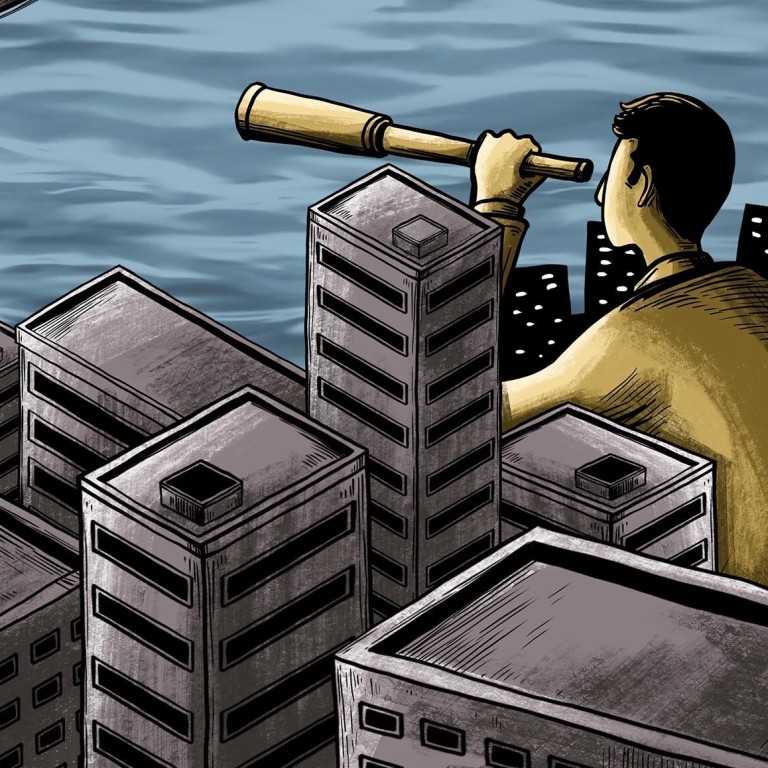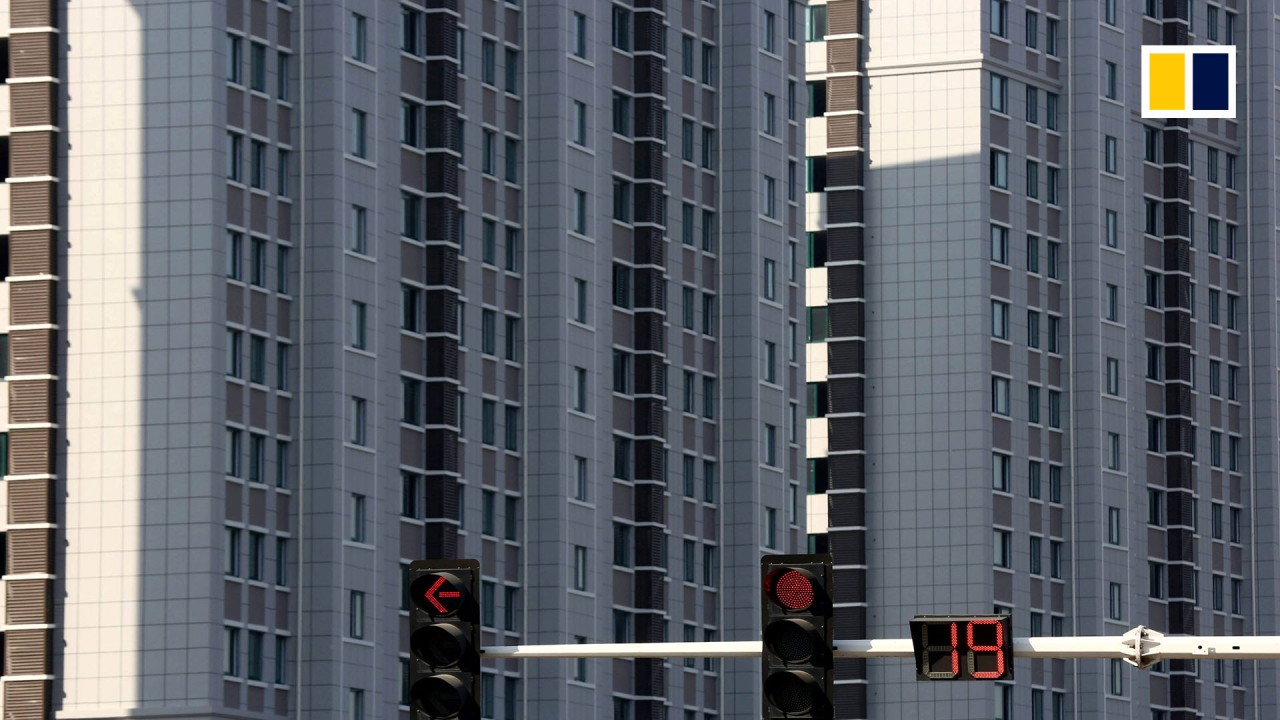
Greater Bay Area: bigger homes, wide open spaces, is this Hong Kong’s ticket to beat housing shortage?
- Older Hongkongers more inclined to move, drawn by lower living costs across the border
- Covid-19 travel restrictions expose challenges of living on mainland, commuting to Hong Kong
As Hong Kong tries to reboot its economy amid the coronavirus pandemic, can the Greater Bay Area provide opportunities that are ripe for the taking? In the second of a three-part series ahead of the city leader’s policy address, Lilian Cheng and Gigi Choy look at whether the region is the answer to Hong Kong’s housing woes. Read part 1 here.
Looking out to sea on a cloudless day, the small Chinese island of Guishan is visible from the southern coast of Hong Kong’s Lantau Island.
A leisure spot and home to about 2,000 people, it comes under the city of Zhuhai in Guangdong province, part of the Greater Bay Area.
Guishan became a talking point in Hong Kong recently, with some politicians and property figures saying it might provide the answer to the city’s chronic shortage of land for housing.
If Hong Kong could have the island and carry out reclamation work there, they said, it would be possible to build a 7,000-hectare city.

The talk about Guishan also put the spotlight on whether the bay area plan could provide solutions to Hong Kong’s struggle to find land for affordable homes.
Given sky-high property prices for tiny flats in Hong Kong, a question being asked is whether residents might be keen to move across the border to live and work.
The bay area comprises Hong Kong, Macau and nine cities in Guangdong province with a combined population of 71.2 million. Beijing’s plan is to transform this southern region into a high-technology powerhouse to rival California’s Silicon Valley by 2035.
With the same budget, you can buy a unit three times as large in Shenzhen compared to Hong Kong
From a survey of 10,000 households between April and July last year, the Census and Statistics Department estimated that about 266,000 Hongkongers out of the population of 7.5 million were interested in moving to, working, or studying in the bay area.
They were drawn by the more spacious homes available there (49.5 per cent), the lower cost of living (44.2 per cent) and cheaper flats (26 per cent).
Older people aged 65 and above were the most keen, with 60.1 per cent saying they were interested in moving there, compared with only 25.9 per cent of those aged 25 to 34, and 21.4 per cent of those aged 15 to 24.
Lantau land-reclamation scheme could ‘wipe out fiscal reserves in less than decade’
“Hong Kong always has an issue with affordability. With the same budget, you can buy a unit three times as large in Shenzhen compared to Hong Kong,” said Martin Wong Shiu-kei, associate director of research and consultancy for Greater China at Knight Frank.
He said Hong Kong’s average property price of at least HK$13,000 to HK$15,000 (US$1,677 to US$1,935) per square foot was almost triple the 5,500 yuan (US$810) per square foot in Shenzhen, which is the most expensive among bay area cities on the mainland.

“People are looking for more space,” he said. “Covid-19 has really changed people’s mindsets in terms of social distancing.”
He was not surprised by the survey findings about who preferred to move to the bay area.
“The younger generation tends to prefer staying in Hong Kong whereas seniors are more open to moving somewhere else or to the bay area. What happened over the past 12 months isn’t going to change this story much,” he said.

Living in the Greater Bay Area: ‘it’s not easy’
There are currently about 500,000 Hongkongers living in mainland cities in the bay area, according to estimates.
Most are retirees drawn by the lower cost of living in cities like Zhongshan and Zhuhai. Some working people live in Shenzhen and, before Covid-19 hit, commuted to Hong Kong daily to work.
After 20 years of living in Guangzhou, Hongkonger Ben Wong, 70, found his routine disrupted by the pandemic when travel restrictions and quarantine requirements kicked in.
Diagnosed with diabetes in 2003, he has been returning twice a year for medical appointments at a public hospital.

02:35
China's ambitious plan to develop it own ‘Greater Bay Area’
The retiree, who lives in Guangzhou with his wife, said there were differences in the quality of health care on either side of the border.
“Most of the medicines offered in the top hospitals on the mainland are slightly different from those in Hong Kong, and not particularly affordable,” said Wong, who takes about half a dozen types of medicine for diabetes, high blood pressure and other chronic conditions.
Unable to return to Hong Kong this year, he used a service offered by the Federation of Trade Unions, which collects medicines from city hospitals and delivers them to Hongkongers living on the mainland.
Professor Chau Kwong-wing, of the University of Hong Kong’s department of real estate and construction, said the pandemic highlighted some of the problems for Hongkongers living in the bay area.
“It’s not that easy,” he said. “You have to cross the border. The pandemic has proven that a lot of problems might occur, like you might be put under quarantine and that will affect your work, studies, or even health care appointments.”
These problems might make people think harder before moving. Nor could they ignore the differences in political and social systems across the border, he said.
Chau was also sceptical about the idea of Hong Kong borrowing or buying land in the bay area for long-term development, saying the mainland cities would want to develop land for themselves too.
The idea of reclaiming the area around Guishan was raised by several pro-establishment political parties early this year, and brought up again last month by the 229-member Hong Kong Real Property Federation (HKRPF).
By reclaiming 6,000 hectares around the island, they said, Hong Kong would be able to build a city to house 800,000 people. A 5km bridge or undersea tunnel could also be built within five years to connect Guishan with southern Lantau Island.
But sources in Hong Kong familiar with mainland authorities said Beijing did not support these ideas, which would also need Guangdong’s agreement.
“Guangdong does not seem to like the idea of giving Guishan Island to Hong Kong, so nothing will proceed now,” a source said. “Unless Hong Kong really fails to carry out the Lantau Tomorrow plan, it will be best to reclaim land of our own.”
Lantau Tomorrow, or maybe not
The ambitious Lantau Tomorrow Vision project is meant to create a 1,000-hectare site off Lantau Island for a new business district and a maximum of 260,000 homes to be built by 2032 in the first phase.
It is fraught with uncertainty, with critics attacking its high price tag of HK$624 billion (US$80.5 billion) and the potential threat to the marine ecosystem, as well as predicting delays and cost overruns.
A year and a half after city leader Lam unveiled the project, her administration’s request for funding to the tune of several hundred millions of dollars for preliminary studies has not been approved by the Legislative Council.
Cost has become more of an issue this year, in the wake of the pandemic and the havoc wreaked on the city’s economy.

After the latest round of Covid-19 pandemic relief measures, Financial Secretary Paul Chan Mo-po said last month that Hong Kong’s reserves stood at only HK$800 billion, the equivalent of just 12 to 13 months of government spending.
Professor Ng Mee-kam, director of the urban studies programme at Chinese University, said the pandemic provided the Hong Kong government an opportunity to rethink its planning for the city.
“In the long run, we may not need another core business district,” she said. “The epidemic taught everyone to reduce contact, and the rapid advancement of technology allows working in a non-fixed point. We should plan how to live smarter with improved design and infrastructure.”

00:58
Hongkongers dreaming of big gains from Greater Bay Area homes could be disappointed
A government-appointed task force on land supply warned in 2018 that Hong Kong faced a shortfall of at least 1,200 hectares by 2046, including 230 hectares for housing.
Ng said he believed there was enough land in the New Territories for homes, but the government had simply not done enough to acquire it from owners who include the city’s major developers and traditional rural organisations.
Is Hong Kong’s time in the sun over after months of protests, pandemic?
‘Take the pressure off Hong Kong’
Terence Lin Chiu-fai, director of the Beijing Institute of Hong Kong and Macau Scholars said both the Lantau Tomorrow project and the Guishan Island idea would only deplete public funds.
The think tank, formed in 2014 by Hongkongers studying at or graduating from top mainland universities, counter-proposed building a new Hong Kong community at the Hengqin district of Zhuhai, next to Macau.
Its plan, which has been submitted to the government, describes a first phase which will see 40,000 spacious homes being built within five years for 120,000 or more Hong Kong residents, in an area of about 500 hectares.
Lin pointed to the Macau New Neighborhood project jointly developed by Hengqin and the former Portuguese colony.

Under the arrangement, a 19-hectare site in Hengqin was sold to Macau and run by a public-funded company to build integrated elderly care, housing, education, and medical facilities and provide 3,800 homes for Macau residents.
Suggesting that Zhuhai and Hong Kong embark on something similar, Lin said: “The Hong Kong government should have more backup plans on development.”
Dr Peter Cookson Smith, former president of the Hong Kong Institute of Planners, agreed that the physical, economic and social future of Hong Kong “is irrevocably linked to that of the Greater Bay Area”.
“The bay area essentially contributes a hinterland for a ‘Greater Metropolitan Hong Kong’ that will almost certainly provide both affordable housing and other opportunities for the coming generation,” he said.
What was needed were tax breaks for Hong Kong businesses moving to the bay area, and joint development of higher education, hospitals or retirement facilities.
“The result would be to take the pressure off Hong Kong, in terms of perpetually having to conjure up more land and urban renewal programmes to exploit development or redevelopment values,” said Cookson Smith, who was involved in planning the free-trade zone of Nansha, in Guangdong.
Among Hongkongers more open to moving is Stanley Ng Chung-ho, 44, who works in finance and travelled to Shenzhen two to three times a week on business before the pandemic.
Married with two children, he said he and his family started thinking of relocating to Shenzhen last year, and would do so once the pandemic was over.
“I don’t want to keep going back and forth between the two cities. Once we’re able to move, we’ll only come back to Hong Kong when there’s a major holiday,” said Ng, who is executive chairman of the Guangdong-Hong Kong-Macao Greater Bay Area Youth Society, which helps young people find opportunities in the bay area.
He has taken his eight-year-old daughter to visit Shenzhen and she is excited about the plan to move there.
“The living standard in Shenzhen is improving and is quite close to that of Hong Kong now,” he said.
Additional reporting by Elizabeth Cheung
Part 1 of this series looks at what could be in store for Hong Kong’s youth and its universities if they go to cities under the bay area scheme.





